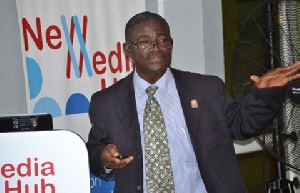 Professor Paul Kingsley Buah-Bassuah,
Professor Paul Kingsley Buah-Bassuah,
The Public Interest and Accountability Committee (PIAC) has launched a comprehensive plan to reform the Committee to better track government’s application of the petroleum revenue for improved living conditions of its citizenry.
About $9.5 million would be required for the successful implementation of the five-year strategic arrangement, which served as a framework for the Committee to prioritise its actions and evaluate its performance.
“This strategic plan, the institution’s first, has been developed to ensure continued success for the operations of PIAC in fulfilment of its core mandate,” Professor Paul Kingsley Buah-Bassuah, an immediate retired Chairman of the Committee said at the launch on Wednesday.
The plan has five key components seeking to strengthen internal structures and operations of PIAC and create conditions for sustainable resource mobilisation.
It also looks to improve visibility of the Committee, create platforms for effective citizen engagement and build strategic partnerships and institutional linkages.
“I want to reiterate here that the pursuit of these goals would require that we continually assess the well-being of our institution,” Prof Buah-Bassuah said: “While simultaneously holding true to our core values.”
He said the plan committed the Committee to continue to improve the collection, validation and analysis of data by engaging stakeholders in the petroleum industry.
“It is expected that such a system will remove possible bottlenecks,” he said, including timely acquisition of information from stakeholders in the compilation of reports.
“It also seeks for a change in addressing the manpower needs of the institution, he added.
In order to accomplish the goals, Prof Buah-Bassuah said, PIAC would still need some funding support from development partners and all stakeholders.
“The implementation of this plan will require some finances from all development partners to enable us engage a broader spectrum of the public as well as generate funds to conduct value for money audits of the projects funded from petroleum revenues.
“The implementation of our plan of action will require substantial financial outlay of about $1.9 million annually.”